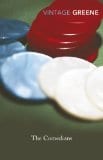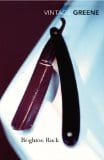Talking Location With … Emily Freud – THAILAND
Authors on location – Graham Greene
4th September 2017
Authors on location – Graham Greene
For some writers location is as integral to their story-telling as plot or character. TripFiction takes a look at some of these authors, for whom a sense of place has helped to define their literary output.
One of the greatest writers of the 20th century, Graham Greene travelled widely throughout his intriguing life, to what he called “the world’s wild and remote places”. As a journalist, war correspondent and MI6 agent, Greene wove the places he visited and the characters he met into much of his work.
Here are just a few of his books, rooted firmly in locations he knew well:
 The Power and the Glory – set in Mexico.
The Power and the Glory – set in Mexico.
Greene spent time in Mexico in the late 1930s, hiding away whilst being sued by 20th Century Fox for a film review he had written about Shirley Temple. Mexico gave him the inspiration for this powerful story, introducing an unnamed “whisky priest”, through whom the author questions the Catholic faith and its values.
The priest is hunted throughout Mexico by a dogged police lieutenant, who is fiercely socialist and anti-Catholic. A brilliant piece of thought-provoking writing, set firmly in an interesting location, I read The Power and the Glory for my English ‘O’ Level in 1973. It has both haunted and inspired me ever since.
 The Quiet American – set in 1950s Vietnam.
The Quiet American – set in 1950s Vietnam.
Greene was a war correspondent for The Times and Le Figaro in Indochina in the early 1950s. The main protagonist of the book is British journalist Thomas Fowler, a cynical middle-aged war reporter who has a young Vietnamese lover, Phuong. The Quiet American is Alden Pyle, an idealist working undercover for the CIA and who believes that neither Communism nor colonialism should prevail in the region, but a new “Third Force”. Pyle falls in love with Phuong, and the ensuing love triangle is a metaphor for the different forces waging war in Vietnam and Indochina. The author was praised for introducing themes predicting American policy and the outcome of the Vietnam war.
 Our Man in Havana – set in Cuba.
Our Man in Havana – set in Cuba.
Greene was in Cuba in 1957, playing a small role in Castro’s revolution by helping to transport warm clothing to the rebels hiding in the hills through the winter. Earlier, as an agent for MI6 in WWII, he had experienced the world of counter-espionage, double agents and misinformation.
These experiences led Greene to create Our Man in Havana: Wormold is a vacuum cleaner salesman, whose wife has left him and who has a beautiful young daughter with expensive habits. Wormold is approached to become an espionage agent for the British Secret Intelligence Service in Cuba, and subsequently creates a web of fictitious agents and misinformation, with unintended consequences.
This is a dark comedy, with the author poking fun at intelligence services, and brought to memorable celluloid life by Alec Guinness in the 1959 film adaptation.
 The Comedians – set in Haiti.
The Comedians – set in Haiti.
Another of Greene’s novels rooted in a troubled location, and exploring challenging themes with a darkly comic touch. The eponymous “comedians” are Mr. Brown (a hotel owner), Major Jones (an Anglo-Indian businessman) and Mr. Smith (a US Presidential candidate planning to build a vegetarian centre in Haiti), all en route to Port-au-Prince on the Dutch ship Medea.
On the island, they all become embroiled in the violent machinations of the oppressive regime of infamous dictator François “Papa Doc” Duvalier and his secret police, the Tonton Macoute. Greene first travelled to Haiti himself in 1954, staying often at the Hotel Oloffson in Port-au-Prince, the inspiration for the author’s fictional Hotel Trianon, owned by Mr. Brown.
 Brighton Rock – set in 1930s Brighton.
Brighton Rock – set in 1930s Brighton.
We know the story of Brighton Rock well from the classic 1947 film adaptation, starring a young Richard Attenborough as Pinkie Brown, a violent and psychopathic gang leader. Pinkie gets drawn into escalating violence in the streets and lanes of Brighton he knows intimately, marrying naive young waitress Rose to try and protect his alibi for the murder of Fred Hale.
Ida Arnold, a kind and decent woman who encounters a terrified Hale shortly before his murder, makes it her mission to protect Rose. This allows the author to contrast the ambiguous Catholic faith of Pinkie with the righteous secular morality of Ida.
 The End of the Affair – set in London during and immediately after the Second World War.
The End of the Affair – set in London during and immediately after the Second World War.
Published in 1951, this novel revolves around a love triangle between Maurice Bendrix, Sarah Miles and her husband Henry. The story includes the author’s favourite themes of obsession, love, anguish and faith, and mirror some of Greene’s own life and marriage.
and faith, and mirror some of Greene’s own life and marriage.
Bendrix, a writer, falls in love with Sarah but she is reluctant to leave her civil service husband. Greene’s regular questioning of faith is introduced when Bendrix discovers that Sarah made a pact with God not to see her lover again, if he survived a bomb blast hitting Bendrix’s flat when they were together. This is another of Greene’s novels adapted for the big screen, the most recent version starring Ralph Fiennes and Julianne Moore.
Andrew for the TripFiction Team
Please do come and join team TripFiction on Social Media:


 Please wait...
Please wait...

Thanks for the great post. I love the idea behind this series on famous authors and the locations they wrote about. If you are looking for suggestions for other authors, Mary Stewart made wonderful use of setting in her romantic suspense novels and her classic Merlin trilogy.
1 Comment
Thanks for the positive feedback about the Graham Greene post, Helena, and about the concept.
Thanks also for suggesting Mary Stewart for the series. Watch this space!
Andrew for TF